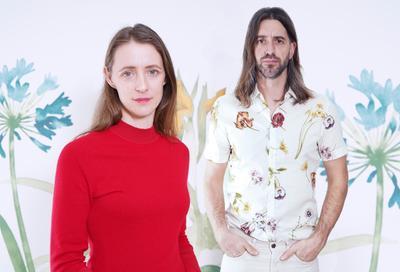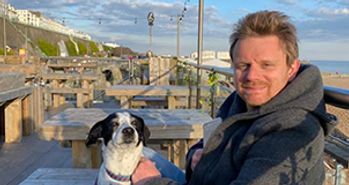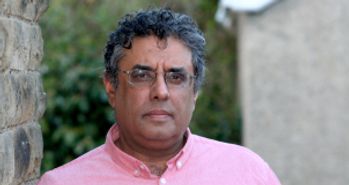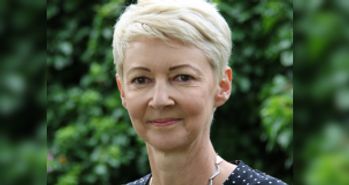As the industry tries to ride out the COVID crisis, we ask Pact members some serious – and some not so serious – questions about their approach to their work and productions.

This week: Emily and Tom Dalton, Factual Fiction
Emily and Tom Dalton are the Yorkshire-based team behind Factual Fiction, which launched with backing from Great Point Media in May 2020. The company combines Emily’s background as MD of Endemol Shine’s DSP and originator of hits The King in the Car Park, The Mill, 24Hrs in the Past, and Made in Great Britain, with Tom’s work as a commercials director and writer/producer of the Agatha trilogy.
There hasn’t been much time for reflection and although this is the first time we’ve run a company together, there’s a shorthand. Which hopefully makes us efficient.
In a word, how are you feeling about 2021?
EMILY: Impatient
TOM: Prepared
Do you have any projects in production at the moment or coming soon and, if so, can you tell us about them and how they’re going?
EMILY: We’ve just started work on a really fun factual project for one of the SVODs, and are gearing up on a couple of dramas – one a limited series and the other we hope will become a returner.
TOM: And although it’s a bit of wildcard, we were approached during lockdown by an American producer who watched one of our Agatha films and wanted us to write a series he was developing. It’s a studio project and has been a fascinating process. Especially as it’s the first time we’ve written together.
You are a husband and wife team. What’s it like running an indie together, especially in the time of COVID when we’ve all been forced to work from home?
TOM: Despite the strange circumstances, I imagine our experience of launching a company is much like anyone else’s: head down and keep the wolf from the door. There hasn’t been much time for reflection and although this is the first time we’ve run a company together, there’s a shorthand. Which hopefully makes us efficient.
EMILY: It just formalises something we’ve always done. We both love TV and film and have always watched shows together, talked about them, discussed ideas. Working and living in the same space does mean there isn’t much home/work divide but I think that’s true for most people during COVID. Plus it’s never been a job you can do 9-5.
You received investment from Great Point Media in 2019. How has that helped your indie to date and what sort of support and expertise do they provide beyond the financial investment?
TOM: Beyond the obvious, we’ve benefited from their ability to help with the fundamentals of programme making – like cash flowing. And although we’ve yet to develop the relationships, their reach into other sectors is very interesting. Virtual Reality AAA gaming (at least the story-telling aspect) is something we’d love to work on.
As long as the job gets done, I’ve always believed in letting people balance their work lives as they see fit.
What film, TV programme or series has most inspired or entertained you in the past 12 months?
TOM: I watched a limited series from Fiji that translates as ‘Man Kills Dog’ which (surprisingly) was about a man’s attempts to kill the dog that ate his mother-in-law. It was like something Lindsey Anderson would have made had he been a little less posh.
EMILY: Better Call Saul – I think it’s absolutely brilliant. It sounds cliched but it makes me laugh and cry and often both at once. I love Rhea Seehorn’s performance. On the factual side I really enjoyed The Repair Shop. Like MasterChef: The Professionals, there’s something very satisfying about formatted TV with heart.
What’s your worst professional habit?
EMILY: Worry
TOM: Assumption
What is your social media platform of choice, and what does that tell us about you?
EMILY: Endless WhatsApp groups.
TOM: None: I hate having my picture taken and don’t think anyone would be very interested in my views on sound design in 1980s action movies.
What one thing about the industry are you most looking forward to returning once we’re over the worst of the COVID crisis? And what are you not looking forward to coming back?
TOM: Being back on set without COVID restrictions. Flying long distance for speculative meetings.
EMILY: I miss sitting in an edit; it can be hard finessing a cut remotely. But equally after a recent edit with long nights and a lot of weekend work, I was very happy to be able to do it all from home!
By concentrating power in the hands of a few individuals there is an inevitable lack of diversity.
What long-term changes to the way you run your teams and your business do you expect to last beyond COVID?
EMILY: As long as the job gets done, I’ve always believed in letting people balance their work lives as they see fit. Factual Fiction has a very flexible approach to office hours and remote working, which has become more widely accepted practise during COVID. I hope it’s an attitude that will endure.
TOM: We worked with Outpost Facilities to set up remote grading and mixing for our recent ITV docs. It allowed us to work real-time with the colourist and dubbing mixer as they controlled our machines. Although it required a certain amount of setting up (e.g. calibrating monitoring to ensure like-for-like with Outpost) the end-result was brilliant. It worked flawlessly and was a great demonstration of lockdown solutions that will outlast COVID.
Who is your creative hero?
TOM: Stephen King. To still be introducing original ideas into the world fifty years after starting out is amazing.
EMILY: I can’t name one single person but as far as work produced goes, I’d say Wolf Hall. From the writing of the books to Mark Rylance’s performance to Debbie Wiseman’s amazing score – that team produced something really special. Which I think is pretty heroic.
If you could change one thing about the industry, what would it be?
TOM: The fear.
EMILY: For terrestrial broadcasters, I would give commissioning power back to individual commissioners. We work with some very talented people, and sometimes an exciting project is lost to a streamer because the person at the very top of the tree doesn’t think it’ll work. They may well be right, but by concentrating power in the hands of a few individuals there is an inevitable lack of diversity.
Pact would like to thank Emily and Tom for taking part in our interview series.



